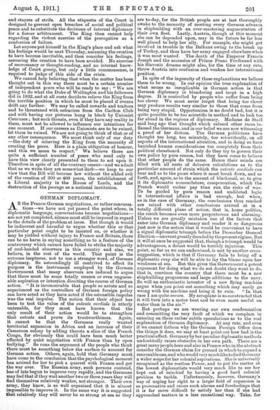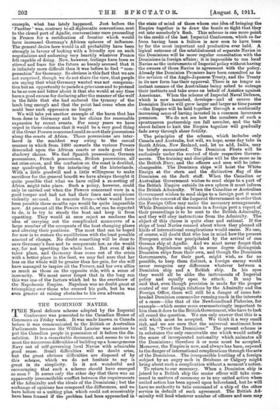GERMAN DIPLOMACY. A S the Franco-German negotiations, or rather conversa- tions—we
have not yet passed the point where, in diplomatic language, conversations become negotiations— are not yet completed, silence must still be imposed in regard to the details of the problem at issue. But though it would be indiscreet and harmful to argue whether this or that particular point ought to be insisted on, or whether it may be yielded without injury to France and Britain, there can be no harm in saying something as to a feature of the controversy which cannot have failed to strike the majority of cool-headed observers in this country and also, we believe, in the rest of the world. That point is the extreme ineptness, not to use a stronger word, of German diplomacy. So astoundingly ill contrived to effect its purpose is the instrument employed by the German Government that many observers are induced to argue that there must be some totally unseen or even unguess- able aspiration or intention directing the course of German action. "It is inconceivable that people so astute and so experienced as the controllers of German foreign policy can have acted as they have acted if the ostensible impulse was the real impulse. The notion that their object has been to test the value of the entente cordials is utterly untenable, for they must have known that the only result of their action would be to strengthen that entente and prove its trustworthiness. Again, it cannot be that the Germans really wanted territorial expansion in Africa and an increase of their Cameroon colony by adding thereto a slice of the French Congo, for obviously this could have been much better effected by quiet negotiation with France than by open bullying." So runs the argument of the people who think there must be something below the surface to account- for German action. Others, again, hold that Germany must have come to the conclusion that the psychological moment has arrived for her to pick a quarrel with France and get the war over. The Russian army, such persons contend, has of late begun to improve very rapidly, and the Germans may feel that if they wait another two or three years they will find themselves relatively weaker, not stronger. Their own army, they know, is so well organized that it is almost impossible to improve it. In the same way it is suggested that relatively they will never be so strong at sea as they are to-day, for the British people are at last thoroughly awake to the necessity of meeting every German advance in shipbuilding with an over-mastering augmentation of their own fleet. Lastly, Austria, though at this moment she can be depended upon, may in the future be far less well placed to help her ally. For example, she might get involved in trouble in the Balkans owing to the break up of Turkey, and thus have her army engaged elsewhere when it was most wanted. The death of the Emperor Francis Joseph and the accession of Prince Franz Ferdinand with his Slavonic dreams might also, for the time at any rate, throw Austria into confusion and weaken her international position.
In spite of the ingenuity of these explanations we believe them to be wrong. In our opinion the true explanation of what seems so inexplicable in German action is that German diplomacy is blundering and inept in a high degree. It is controlled by people who suffer from being too clever. We must never forget that being too clever may produce results very similar to those that conic from being very stupid. Opportunism is no doubt bad, but it is quite possible to be too scientific in method and to look too far ahead in the regions of diplomacy. Madame de Stael said long ago that thought which calmed other races in- flamed the Germans, and in our belief we are now witnessing a proof of her dictum. The German politicians have thought too long, too minutely, too scientifically, on all aspects of the international situation, and in doing so have banished human considerations too completely from their political chessboard. Not only do they try to govern their own policy by pure reason, but they have come to believe that other people do the same. Hence their minds are filled with all sorts of delusive calculations as to the particular amount of strain which the entente cordiale can bear and as to the point where it must break down, and so forth, and, again, as to the amount of blackmail, or, to give it its diplomatic nomenclature, compensation, which the French would rather pay than run the risks of war. To be guided by pure reason and undiluted logic in international affairs is bad enough, but when, as in the case of Germany, the conclusions thus reached are mixed with other conclusions arrived at in a totally different plane of action, that is, home politics, the result becomes even more preposterous and alarming. Unless we are greatly mistaken one of the factors that enter into German diplomacy and render it so dangerous just now is the notion that it would be convenient to have a signal diplomatic triumph before the December General Election—an event greatly dreaded by the present regime. But it will at once be suggested that, though a, triumph would be advantageous, a defeat would be terribly injurious. This point, so far as we can understand, is met by another cross- suggestion, which is that if Germany fails to bring off a diplomatic coup she will be able to lay the blame upon her weakness at sea. But this gives the Government a potent argument for doing what we do not doubt they want to do, that is, convince the country that there must be a new shipbuilding programme and large additions to the navy. So will an enthusiastic inventor of a new flying machine argue when you point out something which may easily go wrong with his machine and bring it to ruin. " In that case I am quite secure. My aeroplane is so constructed that it will turn into a motor boat and be even more useful on water than in the air."- But perhaps we are weaving our own condemnation and committing the very fault of which we complain in entering on these rather subtle speculations as to the real explanation of German diplomacy. At any rate, and even if we cannot fathom why the German Foreign Office does the things it does, we may at least point out how bad is the practical effect. Germany by her peculiar diplomatic methods undoubtedly raises obstacles in her own path. There are a. great many people here and also in France who in the abstract consider the German claim for ground in which to expand a reasonable one, and who would very much like to find Germany a wider scope for her colonial aspirations. She is universally recognized as the restless Power, and to put the matter at the lowest diplomatists would very much like to see her kept out of mischief by having a good hard colonial problem to tackle. Unfortunately, however, Germany's way of urging her right to a larger field of expansion is so provocative and raises such alarms and forebodings that it is far more difficult to satisfy her than if she had approached matters in a less sensational way. Take. for example, what has lately happened. Just before the ' Panther' was, contrary to all diplomatic conventions, sent to the closed port of Agadir, conversations were proceeding in France for a rectification of frontier which would have increased Germany's African spheres of influence. The general desire here would in all probability have been strongly in favour of looking with a friendly eye on such negotiations and endorsing very heartily whatever France felt capable of doing. Now, however, feelings have been so stirred and fears for the future so keenly aroused that it is infinitely more difficult than it was before to find " com- pensation" for Germany. So obvious is this fact that we are not surprised, though we do not share the view, that people are saying that what Germany wanted was not compensa- tion but an opportunity to parade a grievance and to pretend to be so sore and bitter about it that she would at any time have a good excuse for declaring after the manner of the wolf in the fable that she had endured the tyranny of the Iamb long enough and that the point had come when she could bear such oppression no longer.
We will take yet another example of the harm that has been done to Germany and to her claims for reasonable expansion by recent events. For many years we have urged in these columns that it would be a very good thing if the Great Powers concerned could re-sort their possessions along the coasts of Africa. Those possessions are inter- laced in the maddest way owing to the casual manner in which from 1880 onwards the various Powers descended upon the African coasts or made good their shadowy claims. We find Spanish possessions, German possessions, French possessions, British possessions, all set criss-cross, and the confusion on the coast is doubled, nay quadrupled, by the interlacing of the hinterlands. With a little goodwill and a little willingness to make sacrifices for the general benefit we have always thought it quite possible that what we have called a re-sorting of Africa might take place. Such a policy, however, could only be carried out when the Powers concerned were in a good temper and had not had their fears and suspicions violently aroused. In concrete form—what would have been possible three months ago would be quite impossible now. At present all the Powers will do, or can be expected to do, is to try to steady the boat and keep it from upsetting. They would at once reject as madness the idea of carrying out the complicated manoeuvre of a large number of the occupants of the boat changing places and altering their positions. The most that can be hoped for now is to restore the equilibrium with the least possible amount of change. No doubt something will be done to save Germany's face and to compensate her, as she would Bay, for not upsetting the whole boat. But even if this takes place, and Germany does come out of the crisis with a better place in the boat, we may feel sure that her loss on the whole will be greater than her gain, for she will have managed to inspire all the Powers, and her own allies as much as those on the opposite side, with a sense of insecurity. We must never forget that in the long run this was one of the factors which led to the overthrow of the Napoleonic Empire. Napoleon was no dotibt great at triumphing over those who crossed his path, but he was even greater at raising obstacles to his own advance.







































 Previous page
Previous page